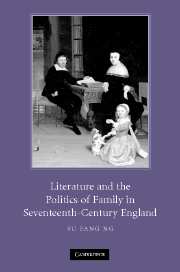Book contents
- Frontmatter
- Contents
- Acknowledgments
- Introduction: strange bedfellows – patriarchalism and revolutionary thought
- PART I REVOLUTIONARY DEBATES
- 1 Father-kings and Amazon queens
- 2 Milton's band of brothers
- 3 Hobbes and the absent family
- 4 Cromwellian fatherhood and its discontents
- PART II RESTORATION IMAGININGS
- Epilogue: the family-state analogy's eighteenth-century afterlife
- Index
2 - Milton's band of brothers
Published online by Cambridge University Press: 22 September 2009
- Frontmatter
- Contents
- Acknowledgments
- Introduction: strange bedfellows – patriarchalism and revolutionary thought
- PART I REVOLUTIONARY DEBATES
- 1 Father-kings and Amazon queens
- 2 Milton's band of brothers
- 3 Hobbes and the absent family
- 4 Cromwellian fatherhood and its discontents
- PART II RESTORATION IMAGININGS
- Epilogue: the family-state analogy's eighteenth-century afterlife
- Index
Summary
CHRISTIAN FRATERNITY
Tracing the causes of the civil wars, Thomas Hobbes argues in Behemoth (1682) that the people were “corrupted” by a number of “seducers”: his comprehensive list includes Presbyterian ministers, “Papists,” sectarians grouped under the name of “Independents,” “men of the better sort” well versed in the classical canon and especially works on ancient republics, the cities, particularly London, war-mongers seeing economic opportunity, and the ignorant people themselves. Much has been made about Hobbes's view that the universities were hotbeds of radicalism, and consequently, the focus has been on his remarks about classically educated men reading Livy and fomenting revolt. Less has been said about Hobbes's other groups. Notably, Presbyterians headed his list, followed by two other religious factions. This is not entirely surprising since Hobbes argues in Leviathan (1651) that religion could be used to deceive the people. But is there more to this than Hobbes's dislike of religious fanaticism? In the second dialogue of Behemoth, speaker B, having been suitably instructed by speaker A, declares, “I understand now, how the Parliament destroyed the peace of the kingdom; and how easily, by the help of seditious Presbyterian ministers, and of ambitious ignorant orators, they reduced this government into anarchy.” Furthermore, in the last dialogue, Hobbes gives to speaker B his famous judgment of the relative merits of Salmasius's Defensio Regia and Milton's First Defence: “They are very good Latin both, and hardly to be judged which is better; and both very ill reasoning, hardly to be judged which is worse; like two declamations, pro and con, made for exercise only in a rhetoric school by one and the same man.
- Type
- Chapter
- Information
- Publisher: Cambridge University PressPrint publication year: 2007

